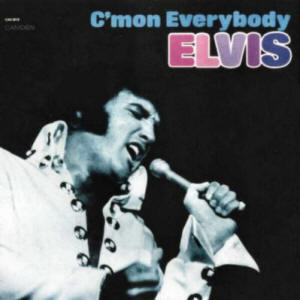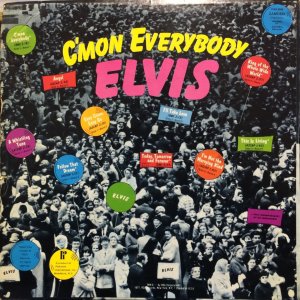

Even though RCA Victor had released "Love
Letters From Elvis" in June 1971, CAMDEN wasn't
shy to issue the budget compilation "C'mon
Everybody" the following month. On July 24, 1971
the album entered the "Top LPs Chart", stayed
there for eleven weeks and peaked at number 70.
This was caused by the low price. To avoid
"bought" chart successes by price dumping,
Billboard calculated the charts by using the
value in USD. In Great Britain the charts were
calculated by sold units, here "C'mon Everybody"
peaked at number 5. The RIAA also based their
awards on the number of sold copies, they
honored the US sales with a Gold Award in 2004.
Worldwide CAMDEN was able to retail two million
units, which translates to 300 million paid
streams of the complete album or 3 billion paid
streams of individual tracks. At the time
everybody certainly was surprised, that "C'mon
Everybody" outsold "Love Letters From Elvis",
which was after all an album with new songs.
In 2016 the complete Presley catalogue was
restored and remastered by Vic Anesini for a
boxed set of 60 compact discs called "The Album
Collection". Sony Music Entertainment provides
the streaming platforms with the same versions
of the individual albums (in this case with "The
Lady Loves Me" and "Sing You Children" as bonus
tracks), albeit in 24 bit/90 khz flac. That
means, if the platform of your choice supports
high resolution audio, you can enjoy the tracks
in the same quality Sony used to scan and master
them. On Spotify, which has a market share of
approximately 30% and is the only platform that
publishes streaming figures, "C'mon Everybody"
accumulates 16 million streams. Therefore it's
on a par with "Love Letters From Elvis" and
"Elvis Country - I'm 10,000 Years Old".
Even though the album was filled with movie
songs from the 1960s, the cover shows a live
photo from August 1970. It's a very good
picture, but it doesn't fit the content at all.
The backside showed a crowd holding up signs and
balloons with the song titles.
After the release of "You'll Never Walk
Alone" the original contract with CAMDEN ran
out. But the label had an option for another two
albums, which of course was drawn due to the
success of the records. This time CAMDEN compiled movie songs, that
had been available on extended players in the
1960s. By now this format was dead and the
releases had been deleted from the RCA
catalogue. So "C'mon Everybody" was a
possibility to buy these songs or to substitute
the old, worn out eps with a new longplayer.
CAMDEN also made the clever move, not to present
complete eps. The rest of the songs would be
released later and so the fans had to buy two
CAMDEN albums to get all the tracks. The
extended players the songs were originated from
were "Follow That Dream" (1962), "Kid Galahad"
(1962), "Viva Las Vegas" (1964) and "Easy Come,
Easy Go" (1967). The running time of the album
is 22:58 minutes.
C'mon EverybodyUnfortunately
this is not the rock'n'roll classic by Eddie
Cochran, but a regular movie song written by Joy
Byers. Elvis recorded it on July 9, 1963 within
five takes. This nice, uptempo track was known
from the ep "Viva Las Vegas". Even though the
film became the king's most successful motion
picture, the soundtrack sold just 500,000 units
and became Elvis' worst selling extended player
since 1958.
Angel
This one had been features on the soundtrack of
"Follow That Dream" in 1962. The ep sold 1.5
million copies and was honored with a Platinum
Award. "Angel" is a beautiful love song that also
could have been released on a regular studio
album. Elvis needed seven takes for the ballad,
which was written by Sid Tepper and Roy C.
Bennett.
Easy Come, Easy Go
The title song was written by Ben Weisman and
Sid Wayne and was recorded by Elvis on September
28, 1966 within nine takes. The singer claims to
have a girl in every port, everything is easy
and uncomplicated. It's a nice, uptempo movie
tune. The extended player sold just 30,000 (!)
copies and became the king's biggest commercial
flop.
A Whistling Tune
Elvis already had recorded the song by
Edwards/David on July 2, 1961 for "Follow That
Dream". The fourth take became the groundwork
for the master, to which Ray Walker added the
whistling. In the end the track was neither used
in the film, nor on the soundtrack ep. After it
was decided that Elvis should perform the song
in "Kid Galahad", he didn't simply use his old
recording, but taped "A Whistling Tune" a second
time on October 26, 1961. This time he wasn't
able to produce a satisfactory take. The master
finally was a splice of the takes 1 and 8. The
extended player "Kid Galahad" sold a million
copies and was certified Gold by the RIAA.
Follow That Dream
The snappy
title song (guess on which ep it was released) was written by Fred Wise and Ben
Weisman, Elvis recorded it within six takes. The
king performs the happy tune with enthusiasm. To
me "Follow That Dream" is one of the best movie
songs of the man from Memphis.
King Of The Whole Wide World
According to this tune everything is fine as
long as you can sing a song. Elvis recorded the
composition by Ruth Batchelor and Bob Roberts on
October 26, 1961, but none of the 31 takes met
his taste. So he taped another four takes on the
next day and selected the final one for release.
In Germany RCA Victor issued "King Of The Whole
Wide World" not just on the "Kid Galahad" ep,
but also on a single, which peaked at number 26
of the national chart.
I'll Take Love
The nice, uptempo popsong from the "Easy Come,
Easy Go" soundtrack was written by Dolores
Fuller and Mark Barkan. Because Elvis couldn't
reach a satisfactory take on September 28th, the
master was spliced of takes number 4, 8 and 3.
Today, Tomorrow And Forever
Bill Giant, Bernie Baum and Florence Kaye turned
Franz Liszt's "Liebestraum" into "Today,
Tomorrow And Forever". On July 11, 1963 Elvis
and Ann-Margret recorded two duet takes, the
musicians produced four instrumental takes
afterwards. Because the producer simply
continued the counting these tracks are archived
as takes 3 to 6. In the end Elvis didn't add his
voice to the music tracks, but recorded six
takes together with the band. "Today, Tomorrow
And Forever" was first released on the extended
player "Viva Las Vegas".
I'm Not The Marrying Kind
In the movie "Follow That Dream" the song is ok, on the record it
sounds a bit weak. Mr. Presley needed eight
attempts to put the composition by Mack David on
tape.
This Is Living
Our time-travel to the king's Hollywood
years ends with a tune from the movie "Kid
Galahad". This is another song on the motto
"Don't worry and enjoy your life". It was
written by Fred Wise and Ben Weisman and
recorded by Elvis on October 27, 1961 within
ten takes.
Verdict
This album offered an opportunity to
replace old extended players or to complete
the collection with songs, that were not
available anymore. The songs themselves are
dencent enough.

(C) RCA Records
/ CAMDEN
![]()

